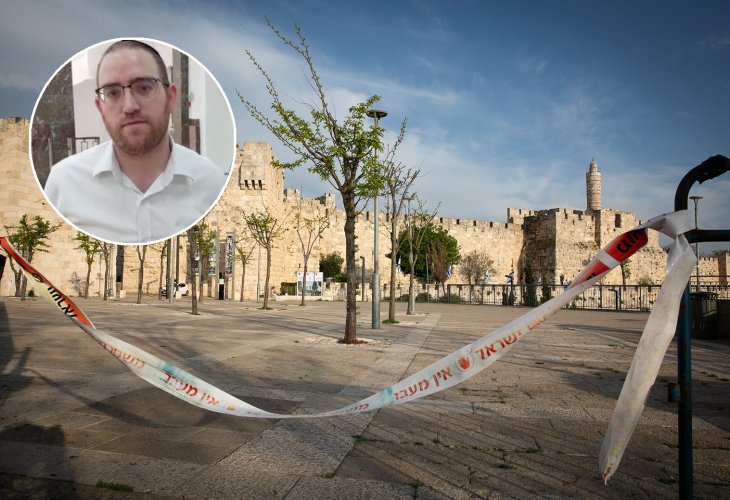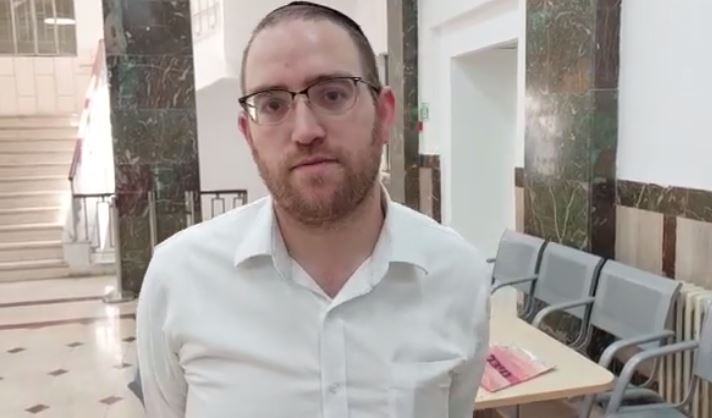"The Knife Struck My Shoe, and That's How I Survived the Terrorist": Survivor of Old City Attack Recounts the Miracle
Avraham Arend just went out for a walk, but was brutally attacked by terrorists. How did the incident end without an indictment, with the claim that no attack even occurred? In a conversation with 'Hidabroot', the attack survivor talks about the long legal saga that recently concluded.
 Photo: Flash 90 (Inset: Avraham Arend)
Photo: Flash 90 (Inset: Avraham Arend)It was just another regular day for Avraham Arend. "I went out for an evening walk with a friend near my home in the Old City, passing through the Jaffa Gate," he recalls in a conversation with 'Hidabroot'. Arend could not have imagined what happened next.
Avraham Arend (30) is a longtime student at Rabbi Zilberman's yeshiva in the Old City. The constant vigilance surrounding his home never threatened him, as he admits. "We trust in Hashem," he says. But on that day, strolling with a friend in his Old City neighborhood, his calm was disrupted. "We were waiting at a traffic light when a car driven by an Arab sped towards us and hit us hard," he recalls.
Are you sure it was a car-ramming attack?
"Certainly," he answers without hesitation. "In fact, I didn't need further proof, since after the two terrorists didn't just hit us hard but also attempted to hit us again after backing up. Fortunately, they failed the second time."
What prevented them from hitting you again?
"It was undoubtedly a great help from Hashem that saved us, but naturally, it seems a pole stopped their car, and we were thus saved from death," he recounts. Reflecting on those moments, Arend struggles to speak. "I lay there on the ground, watching in terror as the car approached again. Realizing in those moments that my life on earth was ending. It seemed there was no chance of survival."
What happened after they realized they couldn't hit you again?
"Afterward, they decided to attack us physically and stormed at us from the vehicle. For long seconds that felt eternal, they attacked us with punches and kicks. I tried to push them away somehow, but my hands and feet wouldn't cooperate," he says. Eventually, when it seemed that their end was near, the terrorists unexpectedly returned to their vehicle and fled. "It seemed like a sudden decision, but later, Jewish passersby told us that they saw others approaching, prompting them to flee."
After the initial shock, Arend discovered numerous police cars and ambulances around him. He was taken to the hospital, where it was diagnosed that he had a complicated fracture in his leg. "I went through long months of rehabilitation, surgeries, and more. Only after four months could I walk again." It was also then that Arend began investigating what happened on that fateful evening. "In those days, I discovered," he says, "that the knife they tried to stab me with struck one of my shoes. I noticed the knife marks when I tried wearing the shoes again after recovering. I realized that as I kicked toward them, the knife hit the sole and shattered. This is how my life was spared. Still, the state did not recognize the event as a terror attack."
 Avraham Arend
Avraham Arend Is there a reason why such a severe incident was not recognized by the state as a terror attack?
"Indeed," he says, "the police decided it was not a terror attack, despite all the signs and evidence indicating that it was a terrorist event. Even the report to the police that night was from a woman who reported witnessing an attack."
Why is that?
"In fact, the officers asked me upon arriving at the scene if I had been stabbed. It later emerged that they asked because they found a knife on the ground next to me. My answer was negative, as I didn't feel stabbed or sustain significant injuries apart from the leg wound." At some point, Arend's lawyer became involved, and together they filed a lawsuit demanding the terrorists' arrest, at least as a 'hit and run' incident. "The absurdity was that the terrorists were arrested that night by the police but released the next morning. Even if it had been an ordinary person causing such an accident, they should have stayed longer in custody," Arend protests.
The Police Discover the Truth
Eight months after the event, while Arend fully recovered and even gave up the hope of having the incident recognized as a terror attack, deciding instead to file a civil lawsuit against the Arab assailants, a turn of events came. "I understood that as a victim of hostile activities, I wouldn't be recognized, but I wanted at least to receive compensation via a civil lawsuit due to the severe accident," he says. Then came a call from the Jerusalem District. "On the line was an officer who told me that the police concluded the event in which I was injured was indeed a terror attack. I was stunned to hear that the police finally acknowledged their mistake."
How did they come to the conclusion that it was indeed an attack?
"It remains a mystery since the police consistently refused to disclose how they obtained information that it was an attempted attack, hiding under a publication ban order. In fact, during the trial itself, held this month, the judges noted they didn't have access to the classified information." The trial, where the state prosecuted the two terrorists, also relied on their confession during intensive questioning by Jerusalem police.
"The judges concluded it was an attempted murder on nationalist grounds," Arend notes. Strangely, despite the terrorists' confession, the judges' decision wasn't unanimous. One judge chose to believe the terrorists' claim that it wasn't an attack and that their confession was coerced under threats by investigators. Regarding the found knife, the judge suggested they might carry a knife for self-defense, as many do, he claimed.
"This fact, that the court determined it was an attempted murder on nationalist grounds, certainly changes the picture for me, but it's not over yet as the terrorists seek to appeal the decision," he says. However, Arend feels confident the event will continue to be deemed nationalist, given the numerous doubts raised by the other two judges in the discussion, such as why they drove onto the sidewalk where the speed should have been relatively slow. "That's why I'm optimistic I'll receive what I deserve."
Despite the legal battle, Arend focuses his energy on studying Torah at Rabbi Zilberman's yeshiva. Despite the severe incident he went through, he expresses hope to continue living peacefully in the Old City, which has witnessed so much violence.

